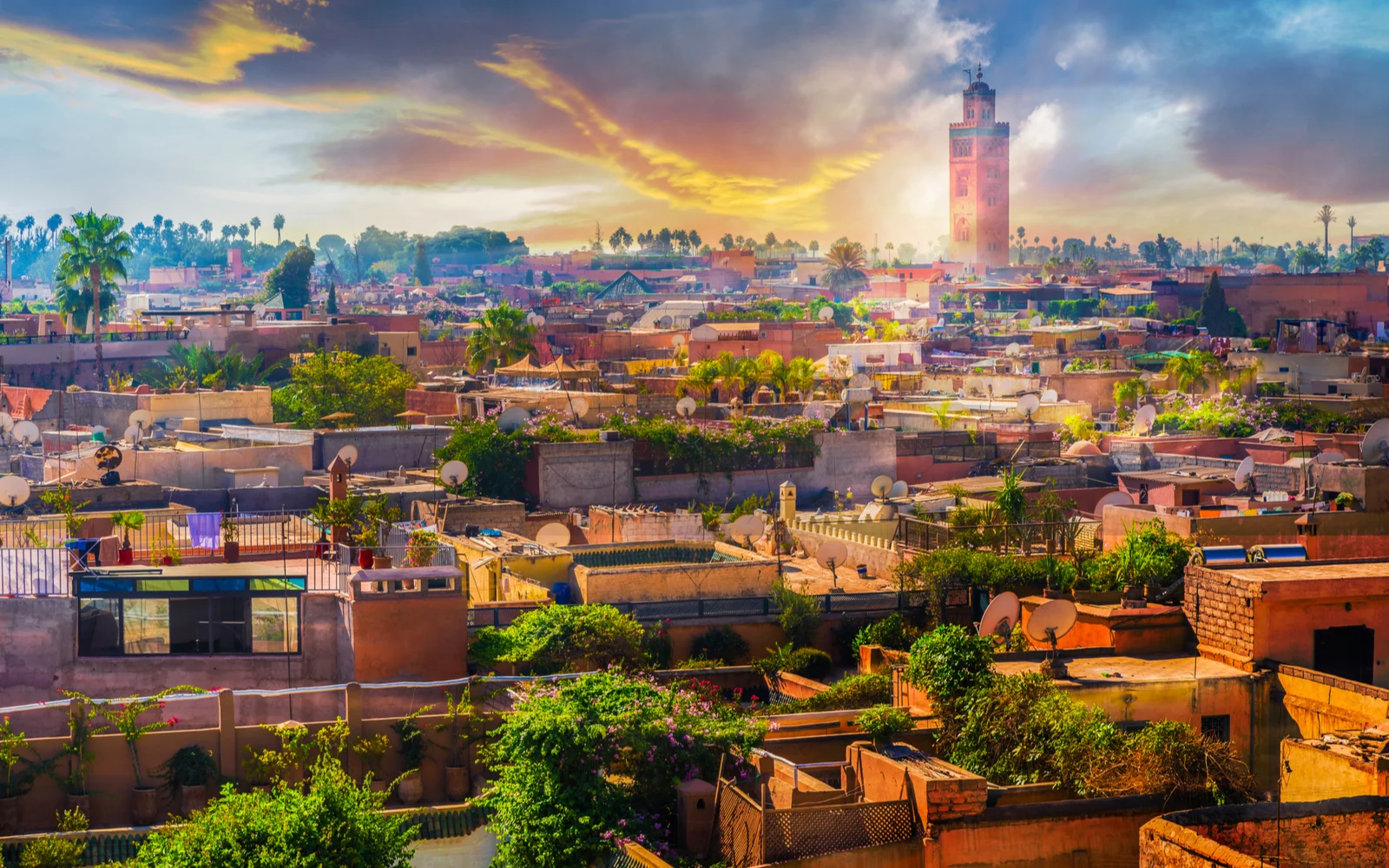The country of Morocco in North Africa is a popular tourist destination and people from all over the world visit to explore its beautiful nature and historic cities. The country hosts about 12 million tourists annually.
Most tourists visit the souks, medieval medinas, and royal palaces of Morocco’s main cities such as Marrakech, Casablanca, and Fez. The country is also dotted with smaller towns, such as the famous all-blue Chefchaouen.
The country’s stark desert and mountainous landscapes attract adventurous tourists, who explore the Sahara at Merzouga or climb the inhospitable Atlas Mountains.
But while there’s countless things to see and do in this country rich in history and culture, is Morocco safe to visit? Here’s our take.
Is Morocco Safe to Visit in 2025?
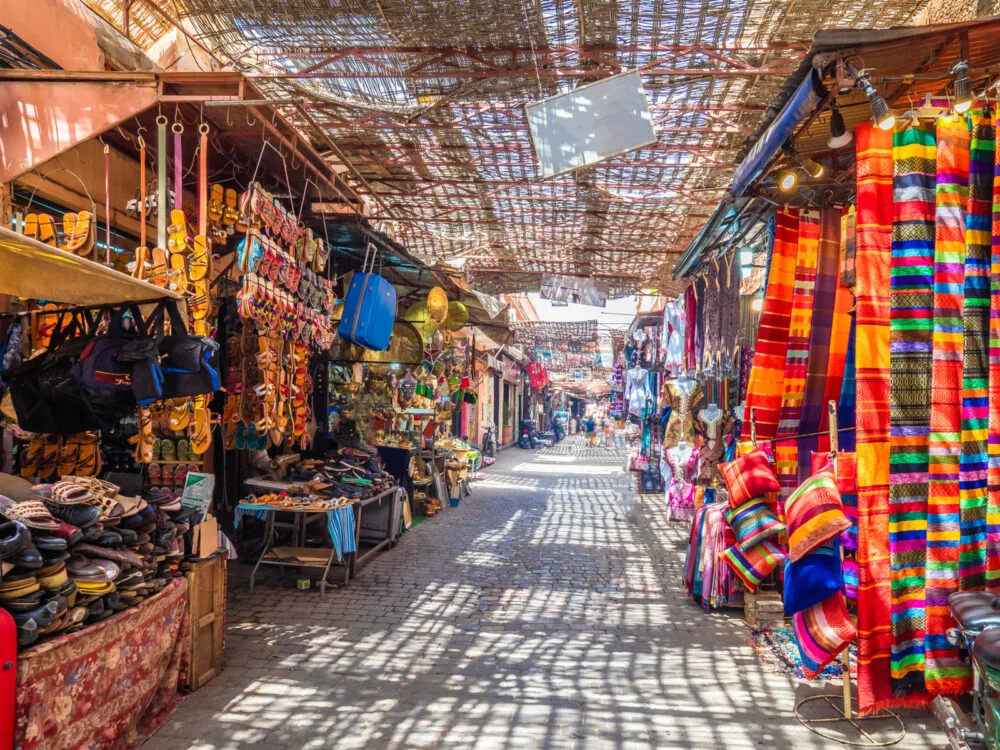
Balate Dorin/Shutterstock
Yes. Morocco is very safe to visit, which is why it is so popular among tourists. Although there are some threats to safety, such as terrorism and crime, these incidents are fairly rare in Morocco.
The most likely problem you will run into as a visitor is some overzealous pickpocketing. That being said, you should take some safety precautions while in the country.
Travel advisories from your country or the government of another country can help you gauge if a trip to Morocco is a safe option for you. Most countries advise that travel is possible, but that travelers should exercise increased caution.
The United States is one of many countries that places Morocco under a Level Two travel advisory. Common problems that countries mention in their travel advisories for Morocco include:
- Terrorism
- Kidnapping
- Purse snatching
- Pickpocketing
- Armed robbery
The risk of these problems is much lower in Morocco than in many other countries in North Africa, but it is still present. It is better to be aware of these problems than to walk into Morocco without taking the right precautions.
The risk of civil unrest in Morocco has increased recently, especially due to the situation in Israel/Palestine. There have been massive pro-Palestine demonstrations in the country, and some demonstrators shouted anti-Western slogans
It’s a good idea to avoid these demonstrations if you are a foreign citizen. The Canadian government updated its advisory for Morocco to warn citizens to avoid these protests as there may be clashes between protesters and security forces.
It’s also vulnerable to some natural disasters. On September 8th, 2023, Morocco was hit by a devastating earthquake with an epicenter in the remote Atlas Mountains.
Villages were razed and people were killed. There is still some infrastructure damage to the rest of Morocco, and aftershocks are possible. Read up on earthquake preparedness so you know what to do in case of an aftershock.
However, it is safe to travel to Morocco at the moment as long as you avoid the areas that were hit hardest by the earthquake. The north and many coastal resorts were virtually unaffected.
Crime in Morocco
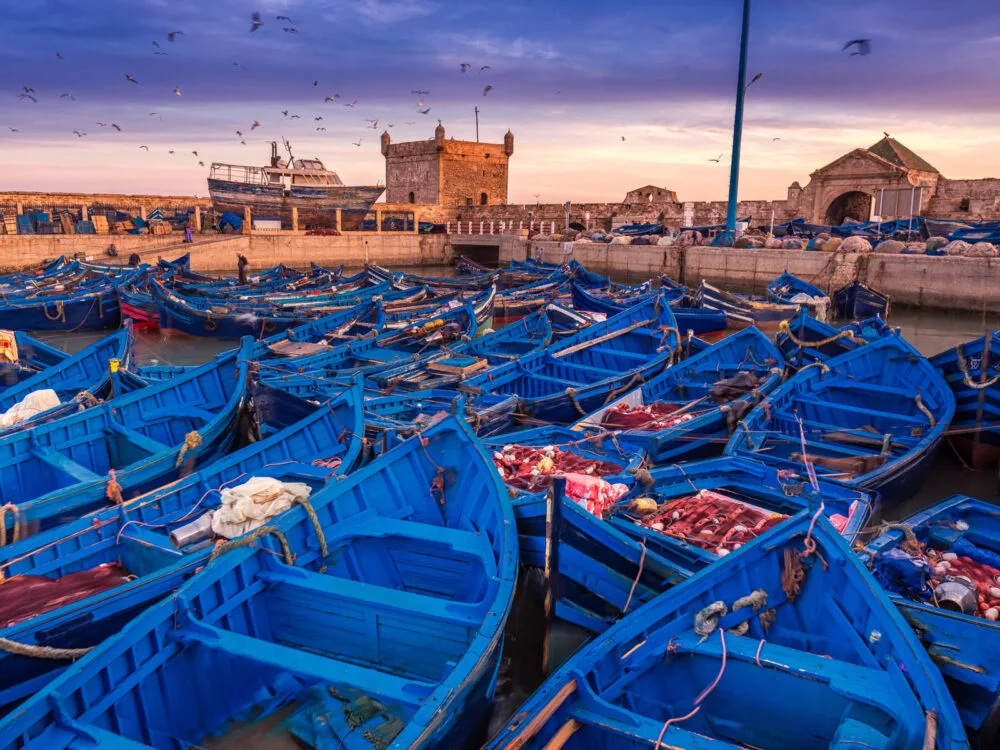
Ruslan Kalnitsky/Shutterstock
Crime is one of the primary concerns for visitors to Morocco. Some of this concern is based in stereotypes about Moroccans and about the dangers of Moroccan souks. However, it is true that crime can happen, and that sometimes visitors are targeted for crimes.
Morocco is considered a country with a medium crime rate. It scores a 49.07 out of 100 on the international crime index, which is a moderate value. This crime index score has remained steady over time.
The good news is that the violent crime rate is fairly low. The homicide rate in Morocco is just 1.93 incidents per 100,000 people, which is a low value. This is a much lower value than in many big cities in the United States.
When the homicide rate is low, the rate of other violent crimes is fairly low. However, the country does struggle with other crimes. Property crimes are fairly common in the country. The official burglary rate is 7.9 incidents out of 100,000 people, although many burglaries probably go unreported.
The same caveat applies to the official robbery rate, which is 135.2 incidents out of 100,000 people. The rate of robbery and other property crimes is fairly high. Many official security reports warn about the possibility of theft, pickpocketing, scams, and other property crimes.
Minor property crime is rampant in Morocco, and incidents often target tourists. Thefts and robberies can occur in major cities and popular tourist areas, such as medinas of cities such as Marrakech and Fez.
However, there is some good news about crime. The World Health Organization praises Morocco for the steps it has taken to curtail violence and violent crime in its society. Anti-crime efforts are yielding results.
The government announced that in 2022 overall crime declined by 30.22%, and that it lowered the violent crime rate to make up only 6.59% of total crime committed. When you visit, you should definitely exercise caution regarding crime.
Make sure that you take precautions against theft and robbery, which is the most common crime that affects tourists. You should also be aware of more violent threats, but they rarely affect tourists. Morocco is safe for tourists—but only if those tourists take common sense precautions.
Terrorism
Terrorism is the crime that people probably worry about the most when it comes to Morocco. It is the crime that is mentioned the most as a reason why people should exercise increased caution, for example in the Canadian government’s official travel advisory.
It is true that terrorism can happen in Morocco. The fact that terrorism is an actual threat in the country is proven by the fact that the Moroccan government arrested about 50 suspected members of Islamic terrorist groups in July 2023.
Morocco is in a region of the world that sees a lot of terrorism, so sometimes unrest from neighbors bleeds over. There have been recent terrorist attacks in the country, such as the 2018 attacks in the remote Atlas Mountains that killed two Scandinavian tourists.
The United Kingdom warns its citizens that terrorist attacks can target foreigners, either through bombings or through more targeted attacks such as homicide or kidnapping. However, the risk of terrorism is actually not that high.
Morocco ranks at #76 in the Global Terrorism Index, which means that countries such as The Netherlands and Austria are considered a higher risk of terrorism than Morocco. Over the past decade, Moroccan authorities have invested considerable efforts into counter-terrorism operations.
Most terrorist attacks that do occur nowadays occur in remote regions, such as certain parts of the Atlas Mountains or the Moroccan-controlled Sahara. As long as you avoid those regions and remote parts of the country, you should be safe from terrorism.
Petty Theft
Although the stereotype as a terrorist-ridden destination is untrue, the stereotype that it has a very high petty crime rate is unfortunately true. Most countries warn their citizens about the very high rate of petty theft in Morocco in their travel advisories.
Australia mentions that petty crime is common in its travel advisory. Theft can happen in popular tourist destinations such as Fez, local markets or souks, the winding ancient quarters or medinas, and beach resorts such as Agadir.
Whenever you are out in public in Morocco, make sure that you keep a firm grasp on your valuables at all times. Invest in a secure cross-body bag or money belt for your valuables such as your wallet or phone.
Never, ever leave your bags unattended, even for a split second. Avoid drawing attention to yourself by carrying lots of cash—you will attract plenty of unwanted attention by virtue of being a foreigner. Be careful when using ATMs as robbers tend to target people using ATMs.
Only use those that are secure, such as those inside banks or post offices. Aggressive beggars also tend to target people around ATMs. When walking in public, make sure that your bag is placed on the side of your body that is away from traffic and walk against the direction of traffic.
Drive-by thefts, when thieves snatch people’s bags while driving by on the backs of scooters or motorcycles, are common. Scams and harassment are also common forms of petty theft.
The UK government warns its citizens about common scams, such as people posing as tour guides for the medina then demanding exorbitant payments (usually after getting you lost).
Only trust tour guides that are officially certified by the city government—most will wear official badges. Leaving Morocco with all the valuables you came with does require some planning, but it is possible if you take the right precautions.
Avoiding Bad Areas
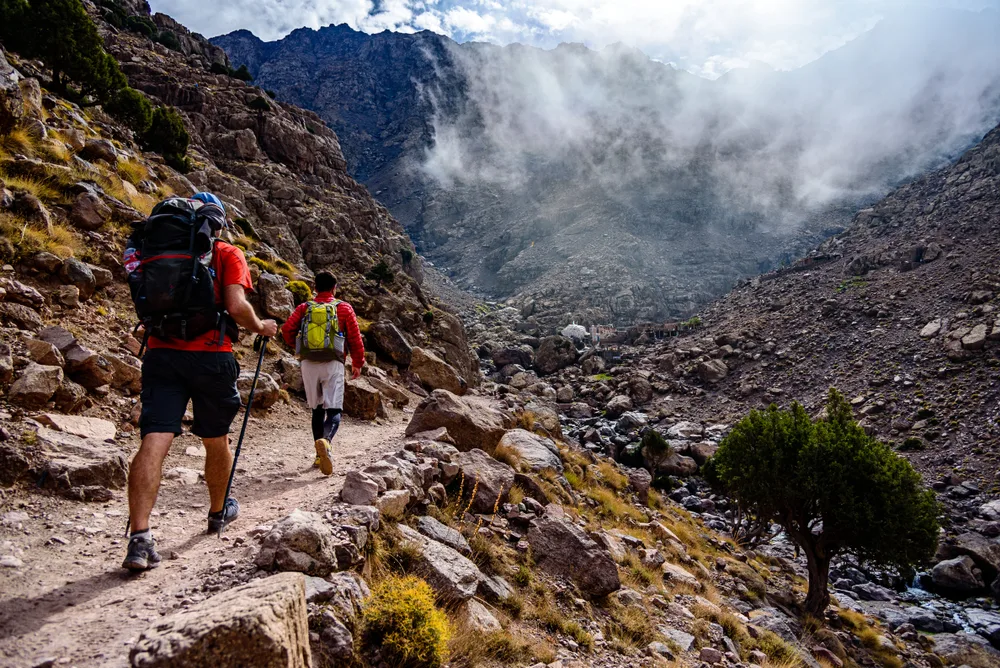
Ondrej Bucek/Shutterstock
There are some parts of Morocco that you should avoid to stay safe. Avoid the Berm, which is the militarized border with the Moroccan-occupied Western Sahara, as well as the Western Sahara itself.
There is a long-time simmering conflict between locals, called Sahrawis, and Moroccan authorities, as well as many unexploded mines in the border region.
Avoid the border region with Algeria.
The remote parts of the Atlas Mountains are home to terrorist groups who often target foreigners. Stick to well-traveled routes that are known to be safe when exploring the mountains. The Rif mountains in northern Morocco are also more dangerous in some remote areas.
Things to Consider
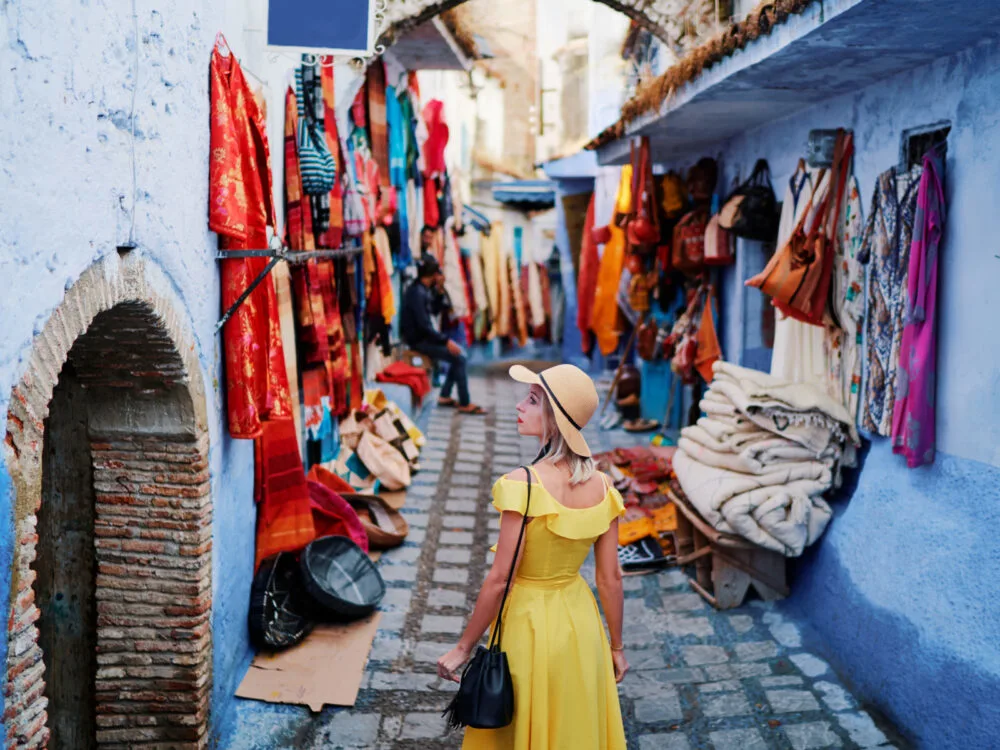
Kudla/Shutterstock
Here are some additional safety tips to help you during your trip to Morocco:
- Tourists have been robbed in Morocco in the past. Avoid walking around alone at night. Robberies and muggings can happen during the day on remote stretches of beach or in quiet parts of town, so be careful during your wanderings.
- Women should exercise increased caution in Morocco. Street harassment and catcalling are unfortunately common problems. Try to wear long, loose-fitting clothing to fit in more and avoid traveling alone after dark.
- Drugs are illegal in Morocco. Penalties for violations can be severe. Although most people have a perception of Morocco as a hedonistic destination, that perception isn’t backed up by evidence. Avoid partaking in illegal drug consumption, even if a local offers you some.
Frequently Asked Questions
Here are some other questions people ask about Morocco before visiting:
Is it safe for tourists to travel to Morocco?
Yes, it is safe for tourists to travel to Morocco because few common-sense precautions are enough to protect you. While there is crime in the country, it can be avoided.
Which is safer: Turkey or Morocco?
The answer depends on what criteria you look at. Turkey has a lower petty theft rate than Morocco, so most visitors feel safer in Turkey. However, Turkey actually has a higher risk of terrorism or civil unrest than Morocco.
How safe is Marrakech?
Marrakech feels gritty sometimes, but its crime rate is low to moderate. Theft and robbery are fairly common though, so make sure you keep a close eye on your possessions.
Is it safe for Westerners to travel to Morocco?
Yes, it is safe for Westerners to travel to Morocco. However, you should avoid remote regions of the country and its land borders, as terrorists sometimes target Western tourists there for kidnapping.
How safe is Morocco for female tourists?
Female tourists do have to take additional precautions in Morocco that their male counterparts do not, but many female tourists visit Morocco safely each year. It is a popular destination for solo female travelers.
So, Is Morocco Safe to Visit?
Morocco is one of the safest countries to visit in the Middle East and North Africa. Although problems such as pickpocketing and robbery are present, and tourists should take precautions to take care of their valuables, most people that visit have a safe, secure time.
The government has taken many precautions in the past few years to combat violent crime and terrorism, making the country safer.



